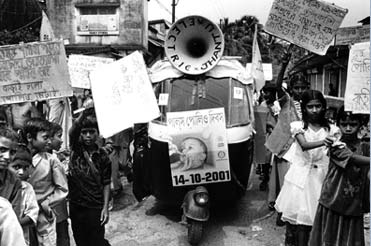Countries that cannot sustain high routine vaccination rates must turn to mass immunization campaigns. These gigantic affairs – called National Immunization Days or NIDs -- demand huge resources and are often conducted with great fanfare. Their success in Latin America in the 1980s helped convince the world that polio eradication was possible and they have been a vital component of the Initiative since then. When progress stalled in the late 1990s, they were launched in more than 100 countries, bringing the world to the verge of polio eradication.
NIDs must be conducted in a country for at least three consecutive years to interrupt poliovirus transmission. They take place over several days, often in harsh and remote regions without health facilities or electricity, sometimes under the threat of war. Complex coordination is needed from the village to the international level to ensure that everything is in place: a functioning cold chain, trained health workers, enthusiastic volunteers and community groups, and sufficient vaccines and funds.
If poliovirus mainly circulates in specific parts of a country, nationwide campaigns are supplemented with localized ones, called sub-NIDs. When intensive targeting is needed, immunizers turn to 'door-to-door' efforts -- literally going to every house – to find all children under five. In places where polio crosses borders with travellers, neighbouring countries co-ordinate campaigns, called synchronized NIDs.
The number of people involved is often staggering. An estimated 1 of every 250 people in a country participates in NIDs. The largest NID took place in India in 2001, reaching more than 150 million children. In early 2001, Nigeria reached 40 million. In late 2001, 17 West African countries conducted a synchronized NID targeting 80 million children.
Since 1998, Vitamin A drops, which reinforce the immune system and protect against deficiencies like night blindness, have also been distributed during NIDs. In countries where malnutrition is severe, this supplemental programme has saved an estimated one million lives.

© Sebastião Salgado
India
Children help promote the start of the October 2001 round of National Immunization Days, on the outskirts of Calcutta. Indian members of Rotary International, whose logo appears here, are key to the country's eradication efforts. They raise funds, rally the population and organize and train tens of thousands of volunteers.
 |